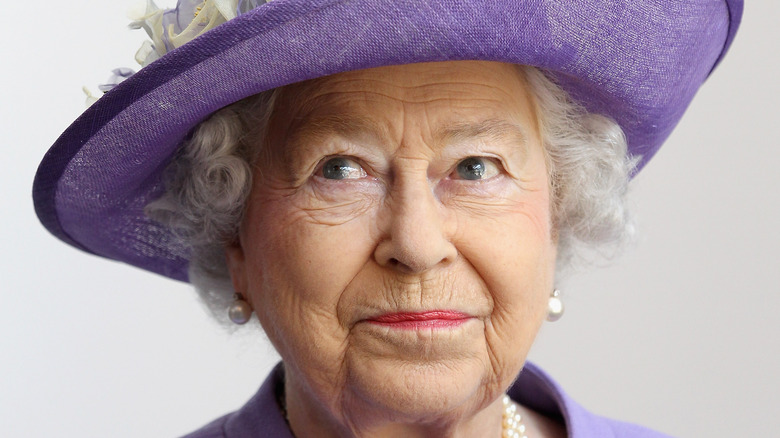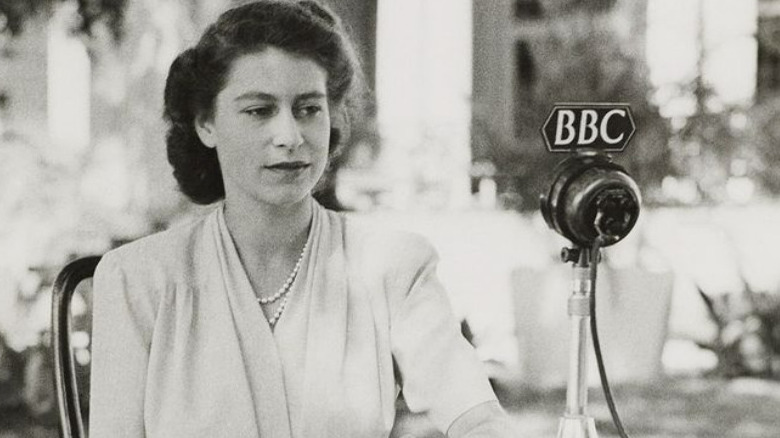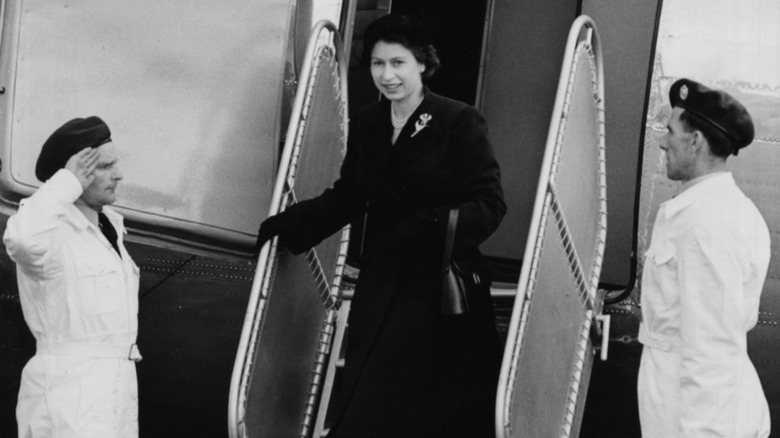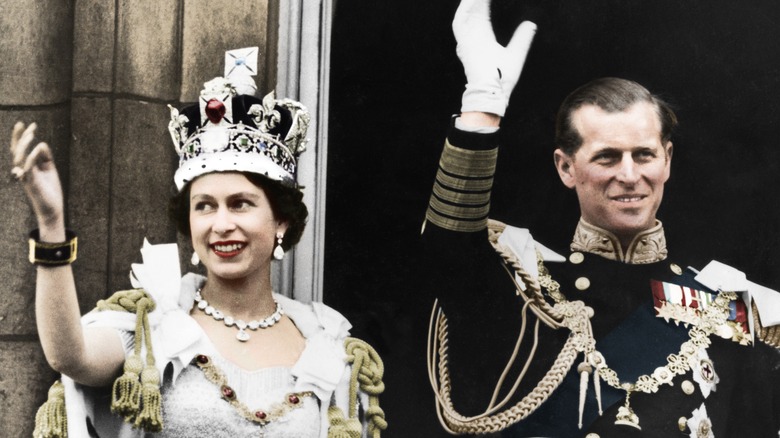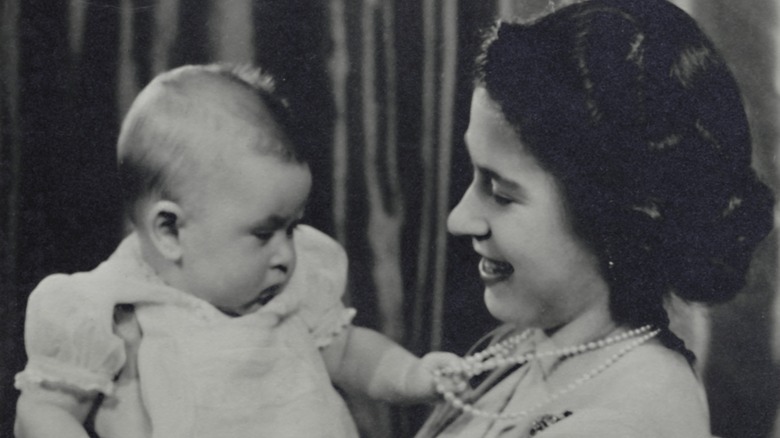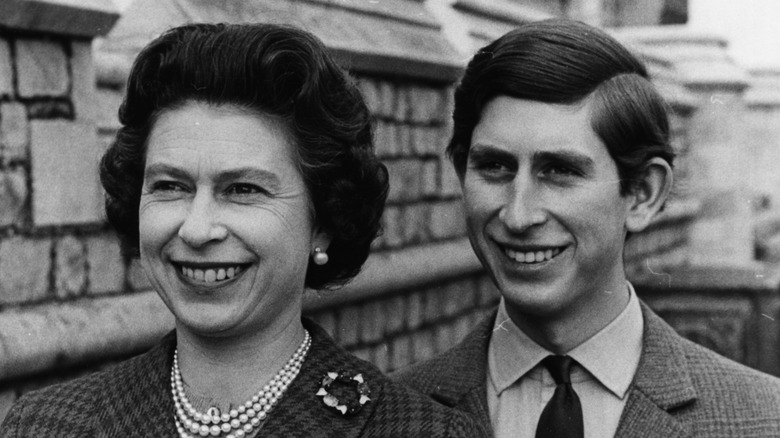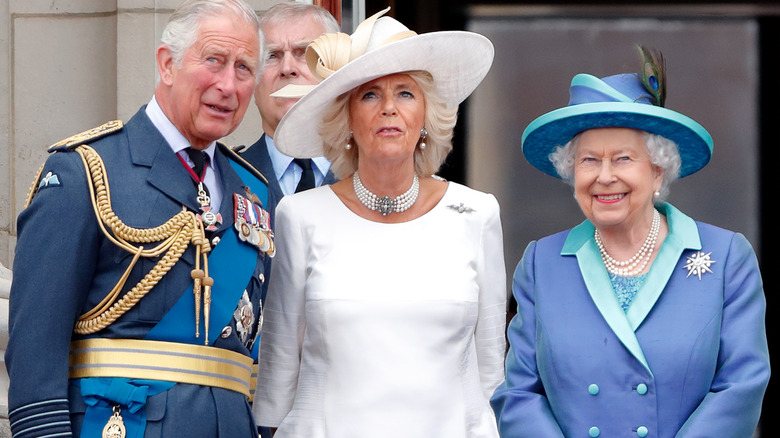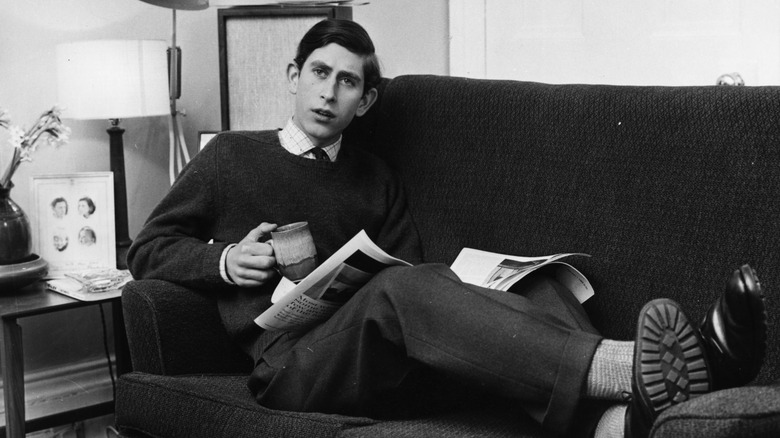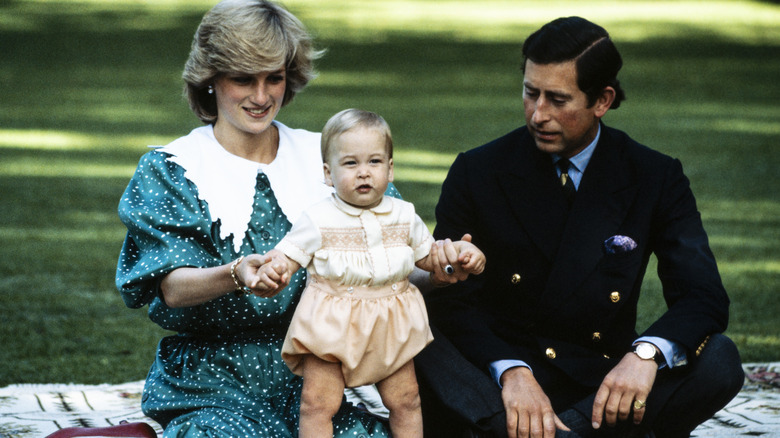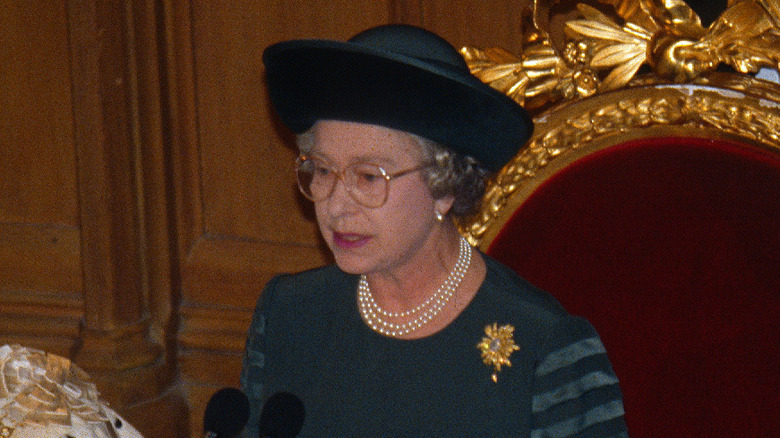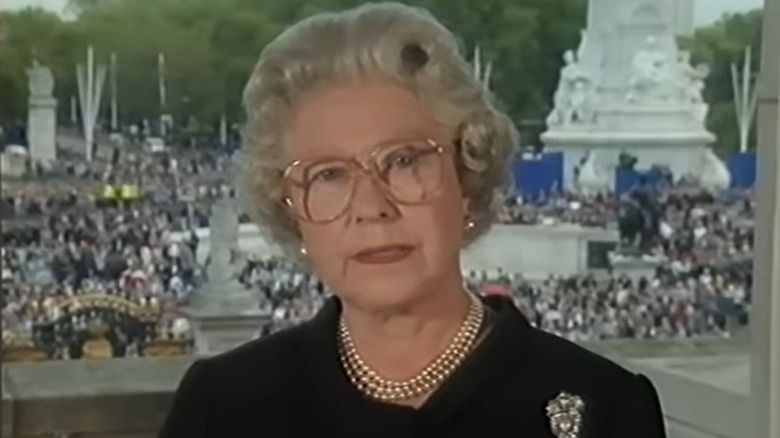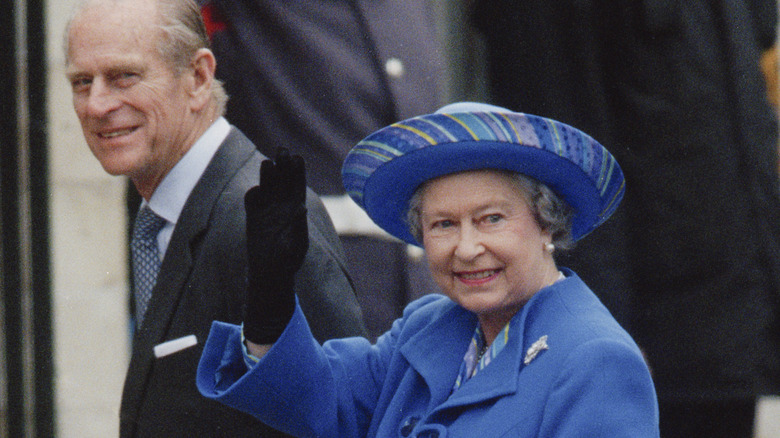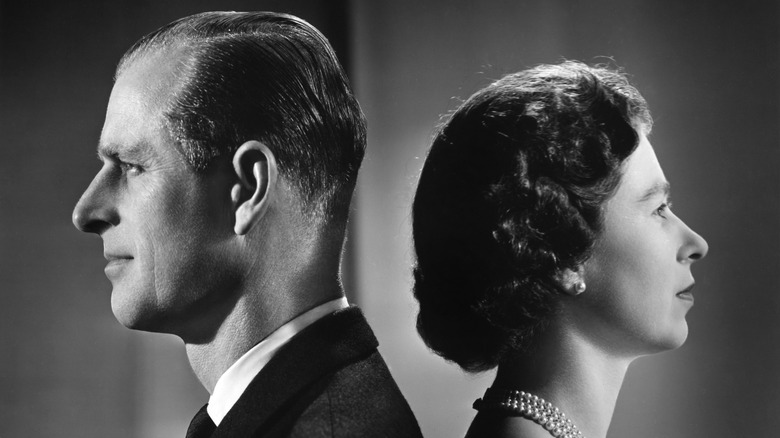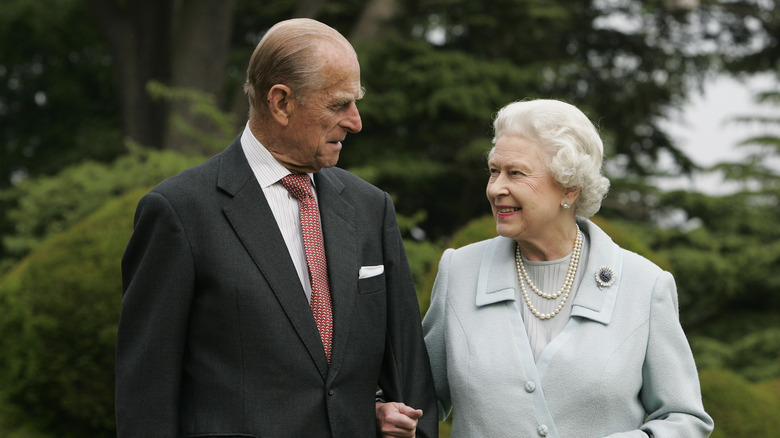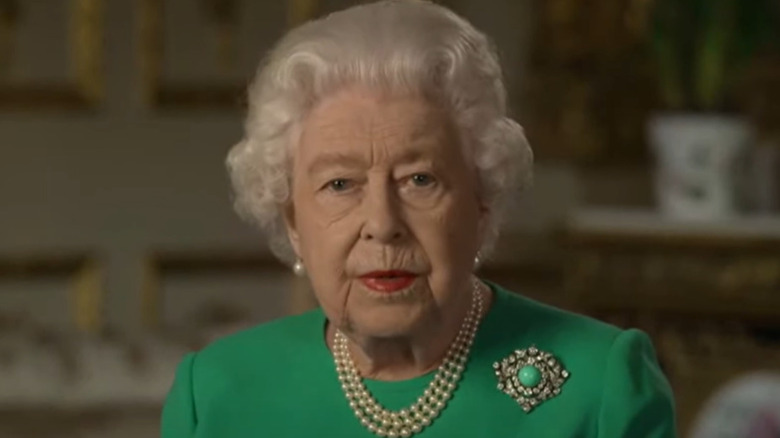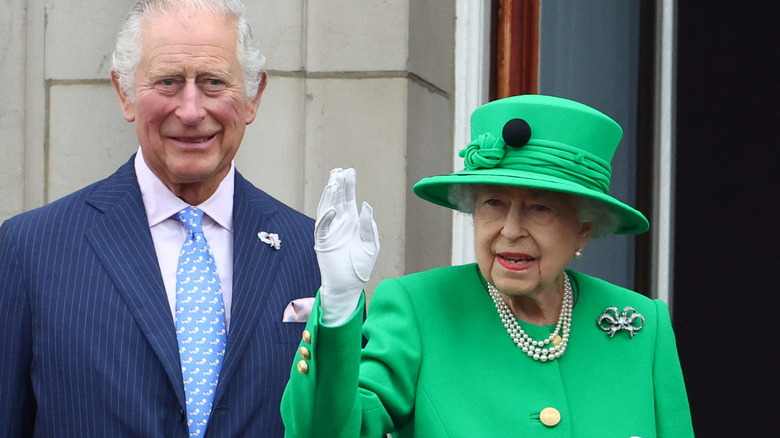Queen Elizabeth's 15 Most Memorable Quotes
As much as the world adored Queen Elizabeth II, who died September 8, 2022, few outside her inner circle can say they truly knew her. Whereas several members of the royal family have, at least some of the time and to their peril, worn their hearts on their sleeves, the U.K.'s longest-reigning monarch managed to maintain a sense of mystery throughout her 70-year reign, if not all 96 of her years, according to The Daily Beast. Some characterized the late monarch as inscrutable. Others spoke of her stoicism, her poker face, and her admirable restraint (via Marie Claire).
"She wasn't just Britain's Queen — Elizabeth II belonged to the world," Bloomberg observed in the wake of her death. But did she? She didn't do interviews, choosing instead to issue statements and prepared speeches. Indeed, the queen was committed to maintaining an aura of mystery around herself, and to the extent that others in the royal family cooperated, them as well. Some maintain that she took this approach in service of the monarchy, about which the British essayist, Walter Bagehot, famously wrote, "Above all things our royalty is to be reverenced, and if you begin to poke about it you cannot reverence it" (via The Daily Beast).
Nevertheless, it's arguable that it's the times when Elizabeth seemed to offer a brief peek behind the curtain that we grew most fond of her. Let's take a look at 15 of Queen Elizabeth's most memorable quotes.
Princess Elizabeth on her intention to serve her country for her entire life
On April 21, 1947, Princess Elizabeth of York, as she was known then, turned 21 while on a royal tour of South Africa with her parents, King George VI and his Queen consort, Elizabeth, and her sister Princess Margaret Rose of York, as she was then-known, according to The Washington Post. The heir presumptive chose that occasion to address the people of the British Empire (as the U.K. and the Commonwealth Realms were called at the time). It wasn't the first time that she had addressed the people, but the speech that she made from Cape Town is one of her most famous, and for many Brits, one of her most thrilling, because it was during that speech that she pledged to devote her life to serving the Empire.
"I declare before you all that my whole life whether it be long or short shall be devoted to your service and the service of our great imperial family to which we all belong," she said, per the royal family's official website.
Queen Elizabeth, reflecting on the day she became queen
There were times when King Charles III, who acceded to the throne upon the death of his mother, Queen Elizabeth II, expressed impatience to have his turn as head of state (per Telegraph). The sobering truth about the creation of a new monarch, however, is that it requires the death of the reigning monarch. In the case of Charles, that meant the death of his beloved mother, which has apparently affected him profoundly, per Us Weekly.
Likewise, Princess Elizabeth became Queen Elizabeth immediately upon the death of her father, George VI, on February 6, 1952 (per the royal family's official website). In a statement given on the eve of the 70th anniversary of her accession, Elizabeth recalled how grief cast a shadow on her experience of becoming queen. "It is a day that, even after 70 years, I still remember as much for the death of my father, King George VI, as for the start of my reign" (via Twitter).
Newly crowned, Queen Elizabeth admits she's learning on the job
The reign of Queen Elizabeth II began the moment her father, King George VI died — despite it taking several hours for news of his death to reach her in Kenya, where she was visiting at the time, according to BBC News. Her coronation wouldn't take place until 16 months later, however, just as King Charles III's won't likely take place until sometime in 2023; this traditional convention allows for both a mourning period and time to plan a spectacular event, the royal family website explains.
Unlike Charles, who, at 73, already had 64 years of experience as Prince of Wales, Elizabeth was just 27 and had only the experience she'd gained on the "job" between the day her father died until the time of her coronation on June 2, 1953. She humbly acknowledged that, and expressed an admirable measure of gratitude in her remarks that day: "Although my experience is so short and my task so new," she said. "I have in my parents and grandparents an example which I can follow with certainty and with confidence," (via The Washington Post).
Queen Elizabeth on how she wanted to parent her own children and not leave it to others
One of Queen Elizabeth's most memorable quotes is something she said shortly after she became a first-time mother in November 1948. "I am going to be the child's mother," she vowed, "not the nurses," according to Kitty Kelley's book "The Royals" (via Vanity Fair). That said, the reason it's memorable is that not long after, it began to emerge that then-Princess Elizabeth wasn't exactly the warmest of mothers, according to Express, at least when it came to her approach to raising her first two children Charles and Anne (after which there was a 10-year gap before the birth of Prince Andrew and another gap of three years before Prince Edward).
Moreover, Elizabeth was frequently away from her children for extended periods while conducting royal business, according to royal expert Robert Hardman (via Page Six). "Mummy [was] a remote and glamorous figure who came to kiss you goodnight, smelling of lavender and dressed for dinner," Charles recalled of her (via Vanity Fair).
Queen Elizabeth's first words to Prince Charles after being away for six months
The relationship between the late Queen Elizabeth II and her firstborn son, the newly ascended King Charles III, was complicated, according to Vanity Fair. "I think everything that we know points to the fact that it was distant," royal commentator Richard Fitzwilliams said of the queen's relationship with her heir apparent. And one of the things that we know is that the very first words that Elizabeth was heard to have said to Charles, age five, upon her return home following a six-month absence, were: "No, not you, dear."
According to author Kitty Kelley, soon after Elizabeth became queen, she and Prince Philip left for a six-month royal tour, leaving Charles and Anne at home with the help. When they returned, Charles was so excited, particularly to see his mother, that he broke protocol by racing to the front of the receiving line. It was when the queen saw her son in line that she uttered that now-famous line. "She did not hug him or kiss him; she simply patted his shoulder and passed along to the next person," Kelley writes.
Queen Elizabeth's famous toast to then-Prince Charles on his 70th birthday
Despite the late Queen Elizabeth's seemingly hands-off mothering style vis a vis Charles and the tensions that Charles' troubled marriage to Diana (and ongoing affair and eventual marriage to Camilla) caused for both the queen and her relationship with her son, it seems mother and son came to mend fences in the last two decades. In fact, at various times in recent years, Elizabeth was heard speaking of Charles with unprecedented warmth, respect, and appreciation. One notable example is when she toasted Charles at his 70th birthday party in 2018 (via the royal family official website).
"I have seen Charles become a champion of conservation and the arts, a great charitable leader — a dedicated and respected heir to the throne to stand comparison with any in history — and a wonderful father," she said. "Most of all, sustained by his wife, Camilla, he is his own man, passionate and creative. So, this toast is to wish a happy birthday to my son, in every respect a duchy original."
On the birth of Prince Charles
According to royal commentator Richard Fitzwilliams, Elizabeth's mothering style may have been nothing more than a product of the times and her place in society. Hands-off parenting was simply how things were done at the time, at least in the aristocratic class (via Vanity Fair). Moreover, let's not forget that at the same time that Elizabeth was getting used to being a mother, she became a monarch. So, it's fair to say she had a lot going on.
In any event, one of Queen Elizabeth's most memorable quotes leaves no doubt that she was thoroughly enamored with her firstborn from the moment of his birth. "Fine with long fingers — quite unlike mine and certainly unlike his father's," she marveled in a letter to a friend the month Charles was born, as noted in Anthony Holden's 1979 biography, "Charles Prince of Wales" (via Reader's Digest). "It will be interesting to see what they become."
On the birth of Prince William, the queen had these snarky words to share
"Thank heavens he hasn't ears like his father," Queen Elizabeth II is said to have remarked on the occasion of seeing her newborn grandson, Prince William, for the first time, according to Marie Claire. As you can see from the above photo, the queen's vision was flawless. So too was her sense of humor. One of the finest examples can be found in a story relayed by her former security detail, Dick Griffin (via Twitter).
As the story goes, Elizabeth was enjoying lunch al fresco near Scotland's Balmoral Castle when a pair of American hikers ambled by. Stopping for a quick, friendly chat, it quickly became apparent — thanks to numerous questions about the queen — that the two had no idea who they were talking to. Gamely, Elizabeth never let on. In fact, when asked if she had ever met the queen, the queen's reply was the verbal equivalent of a single eyebrow raise: "Well, I haven't, but Dick here meets her regularly."
On the demise of three of her children's marriages in 1992
The year 1992 was the year that Andrew Morton's controversial tell-all, "Diana: Her True Story" came out (via The New York Times). And while it wouldn't be known for another five years that Morton's source was none other than Princess Diana herself, the book caused considerable agita for the queen that year. The year 1992 was also the year Princess Anne divorced the father of her children, Captain Mark Phillips, and the year that Prince Andrew and his wife, Sarah Ferguson, announced the end of their marriage following the release of scandalous photos in which the Duchess was captured having her toes sucked by her financial advisor (via Town & Country).
The year 1992 was so bad for the queen, in fact, that she even gave it its own nickname: As she explained during the festivities surrounding the 40th anniversary of her succession, "1992 is not a year on which I shall look back with undiluted pleasure. In the words of one of my more sympathetic correspondents, it has turned out to be an 'Annus Horribilis.'" That's Latin for "horrible year."
The queen rarely explained herself, but in this one instance, she made an exception
"Never complain, never explain" is often said to be the unofficial royal family motto, per Marie Claire. And Queen Elizabeth behaved accordingly throughout most of her reign. However, she made an exception after Princess Diana's tragic death in 1997. Although famous for her stoic reserve, Queen Elizabeth drew ire for having kept her counsel in the days following Diana's death. When she did address the public in this regard on September 5, 1997, it was not only to speak warmly of Diana, as both a humanitarian and a mother, but also to defend — and let's face it, explain away — her reserve in the face of the tragedy.
"It is not easy to express a sense of loss," Elizabeth reminded her critics and fans alike on this occasion, captured above. "The initial shock is often succeeded by a mixture of other feelings: disbelief, incomprehension, anger — and concern for those who remain," she explained. "We have all felt those emotions in the last few days," she assured anyone still in doubt.
Queen Elizabeth, giving props to her husband after 50 years of marriage
"He is someone who doesn't take easily to compliments," Queen Elizabeth II said of her husband, Prince Philip, in a speech commemorating the couple's golden wedding anniversary in 1997. "But he has, quite simply, been my strength and stay all these years, and I and his whole family, and this and many other countries, owe him a debt greater than he would ever claim, or we shall ever know."
In an interview with The New Yorker several days after Elizabeth's death, Simon Schama, a British historian and professor at Columbia University, gave the late queen herself props for having cultivated a successful and enduring marriage with Philip, against all odds — especially considering that three of her four children couldn't seem to do so, at least their first go-round. "The marriage between her and Philip was amazingly durable," Schama observed.
Queen Elizabeth on her enduring attraction to her dashingly handsome husband
The late Queen Elizabeth II married Prince Philip on November 20, 1947, according to the official website of the royal family, and their marriage lasted until Philip's death in April 2021. Although just 21 at the time of her marriage, the then-Princess Elizabeth had been crushing on Philip since her early teen years, according to Us Weekly. The two, who were distant relatives through at least two familial lines, per Reader's Digest, met for the first time at the 1934 wedding of their family members, Princess Marina and Prince George. Elizabeth was eight, and Philip was 13. Sparks did not fly, but when the two met again when Elizabeth was 13, she was smitten with the handsome, athletic young Royal Naval College student, according to Time and Oprah Daily.
The two began a lengthy correspondence that spanned the second World War, during which Elizabeth kept a photo of Philip close by. "That mischievous, enquiring twinkle was as bright at the end as when I first set eyes on him," she recalled of Philip after his death in 2021, per the royal family website.
Queen Elizabeth on the truth about marriage
Queen Elizabeth was known for her extraordinary decorum, according to The Washington Post. Even while raising four headstrong children and navigating marriage to a headstrong man, the late queen mostly managed to maintain her staid composure, even when faced with challenges that might have dissolved the rest of us into a quivering mess. Of course, no one can be perfect, not even the queen. However, even in those rare moments in which Elizabeth let down her guard, perhaps unwittingly, she still managed to do so with admirable poise.
One such moment occurred during a royal tour of Australia in 1954, according to The Guardian. When an apparent domestic squabble between Philip and Elizabeth was inadvertently caught on film, Elizabeth calmly apologized and reminded the cameraman that "it happens in every marriage." Then, rather than demanding he destroy the footage, she simply asked, "Now, what would you like me to do?" In the end, the footage never saw the light of day. Or, more precisely, the cameraman proceeded to overexpose it and hand it off to the queen's press secretary. Many a celebrity could learn a thing or two.
Queen Elizabeth's inspiring words during COVID-19
The United Kingdom is a type of monarchy known as a constitutional monarchy, according to the official website of the royal family. This means that all political power resides in the parliament, but the king or queen is the ceremonial head of state. Although anti-monarchists may say that the role is entirely superfluous at this point (via The Guardian), many taxpaying Brits disagree, including the many who were grateful for the queen's calm in the face of turmoil at various times during her reign.
One such example occurred early on during the COVID-19 pandemic. In the midst of economy-killing lockdowns juxtaposed with furtive discussions of this somehow being the "new normal," Queen Elizabeth took to the airwaves on April 5, 2020 to remind her countrymen that "Better days will return. We will be with our friends again. We will be with our families again. We will meet again" (via YouTube). Coming from the same woman who lived through (and served during) World War II, among other periods of global chaos, it was exactly what many needed to hear.
Queen Elizabeth on her intention, even in her final year, to serve until death
Queen Elizabeth's mother, the former Lady Elizabeth Bowes-Lyon, lived to be 101, according to Metro, and so it was not inconceivable that the queen would live that long, or longer, herself. As Elizabeth drew closer to her Platinum Jubilee, talk increasingly turned to whether she would abdicate in favor of the Prince of Wales, or even, perhaps, the Duke of Cambridge. But abdication as a result of age alone was never really in the cards, nor was the appointment of a regent.
Some theorized this was an effort to minimize the length of the somewhat divisive King Charles III's reign (via the Observer). Alternate theories abounded as well (per Marie Claire). However, not once in her reign did Queen Elizabeth ever so much as suggest she might abdicate. In fact, from the age of 21, she made abundantly clear her intention to serve until she took her last breath.
"My heart has been with you all," she reiterated just months before her death at age 96, "and I remain committed to serving you to the best of my ability" (via CBC News).
